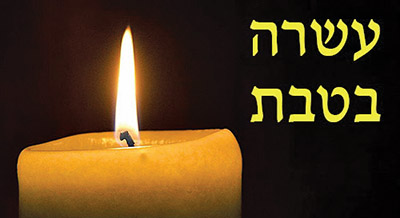
The fast of Asara b’Tevet (“the 10th of Tevet”) is unique when compared to the other fast days that are mentioned in the Prophets. Even though everyone agrees that when the other fasts fall on Shabbat they are pushed off, when it comes to Asara b’Tevet there is the unique opinion brought down by the Avudraham that even if Asara b’Tevet would fall on Shabbat we would observe the fast on that day just as we would for Yom Kippur (see Beit Yosef, Orach Chaim 550). The reason for this is because the pasuk in Yechezkel (24:2) that describes Asara b’Tevet says “b’etzem hayom hazeh,” on this very day, indicating that an integral component of the fast is that it occurs on this very day. This view, however, needs to be understood in light of the fact that even Tisha b’Av, which commemorates the destruction of the Beit Hamikdash, doesn’t override the Shabbat. What is it about the fast of the tenth of Tevet that sets it apart from the other fast days? Even though this halacha has no practical application, since the tenth of Tevet will never actually fall out on Shabbat, by exploring the answer we will nevertheless arrive at a deeper understanding of the nature of this remarkable day.
The Chatam Sofer (Torat Moshe, drasha l’zayin Adar) says that historically, on Asara b’Tevet, the bet din shel ma’alah, the Heavenly court, was adjudicating the matter regarding the destruction of the Beit Hamikdash. It was on this day that the final verdict of its destruction was agreed upon, and it was then that the siege surrounding Yerushalayim began. However, this wasn’t a one-time event. Every year on the tenth of Tevet the Heavenly court reassembles and reassesses whether the Beit Hamikdash will be destroyed, as we are told that every generation in which the Beit Hamikdash is not rebuilt is as if it was in that generation that it was destroyed (Yerushalmi, Yoma 1:1).
The halacha dictates that one may not fast on Shabbat because it takes away from the mitzvah of oneg Shabbat, enjoying Shabbat. However, if one is disturbed because of a dream and wishes to fast, he may do so even on Shabbat (Orach Chaim 288:1,4). The reason for this is that the upsetting dream is a way of conveying that there is a potentially worrying judgment being made against the individual, and, by fasting, this person has an opportunity to reverse this judgment (see Shabbat 11a, Ta’anit 12b). Since the fast has the power to relieve the individual’s distress, fasting is considered more of an oneg Shabbat for him than eating (Rashba, Brachot 31b in the name of Rav Hai Gaon). Therefore, he is allowed to fast.
With this understanding, we may now explain the unique nature of the fast of Asara b’Tevet in contrast to the other fasts. The Chatam Sofer explains that this fast day is similar to the fast following an ominous dream, for it too is coming to annul the unfortunate judgment that dictates that the Beit Hamikdash should remain in ruins. It follows from the above that fasting for Asara b’Tevet on Shabbat does not take away from the mitzvah of oneg Shabbat, since through the fast one is able to reverse the decree of the destruction of the Beit Hamikdash.
The Rambam says: There are days on which all Jews fast because of the calamities that befell them. This is in order to awaken the hearts and open the ways of repentance, and to serve as a reminder of our evil deeds and the evil deeds of our fathers that were similar to our deeds that caused them and us those calamities. Through this reminder we will repent and fix our ways… (Hilchot Ta’aniyot 5:1).
As is clear from the words of the Rambam, the purpose of fasting is to trigger teshuvah, repentance. Just like the fast for a bad dream annuls the decree only if it is followed by repentance (Sefer Chasidim 226), so too the fast on Asara b’Tevet is only as powerful in relation to the degree to which we better our ways. May we all contribute to bring a favorable judgment on Asara b’Tevet and thereby merit seeing the rebuilding of the Beit Hamikdash speedily in our days. (Special thanks to Grunny Zlotnick for bringing this column and subject to our attention – JLNJ Editors.)
Rabbi Chaviv Danesh/Ohr Somayach









